(IJCH) Rediscovering Greek Mythology - The Minotaur (or Why I feel sorry for the creature and am NOT a Big Fan of Theseus)
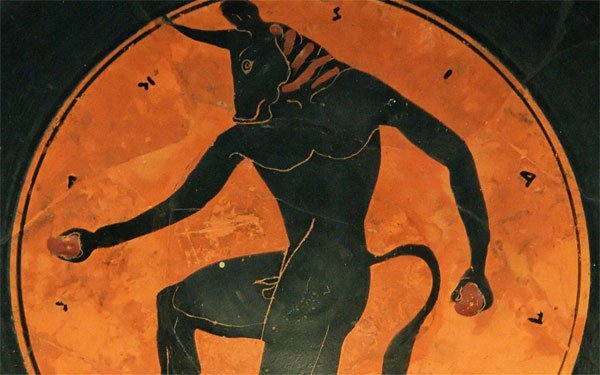
IJCH - Inside JaiChai's Head (Meaning: My Warped, Personal Opinions and Musings)

From the Author:
Salutations.
I am JaiChai.
And if I haven't had the pleasure of meeting you before, I'm delighted to make your acquaintance now.

I invite you to interact with everyone, learn, and have as much fun as possible!
For my returning online friends, "It's always great to see you again!"
Continuing The Journey
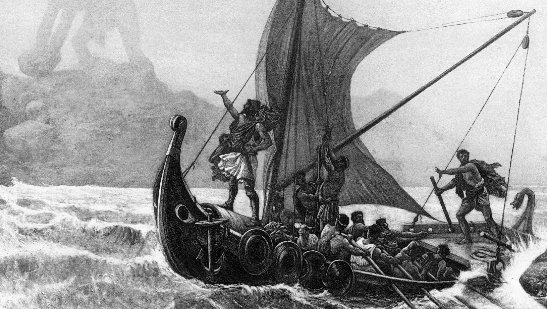
The next stop on my "Rediscovering Greek Mythology" journey is the story of the Minotaur.
Before researching the Minotaur, all I knew about him was that he was a hybrid creature with a bull's head and horns on top of a huge, muscular human body, voraciously ate human flesh, and his home/prison was an inescapable maze called "The Labyrinth".
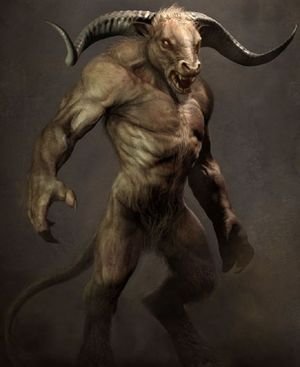
In regards to the Minotaur's story, it was obvious to me that I had a lot of blank holes to fill in.
Many questions popped into my head, such as:
Why was he created?
How did he come into being?
Why were human beings fed to him?
Who supplied the "People Happy Meals"?

Did he have a "human side" or was he always just an enraged beast?
Who killed him?

Etcetera...
So, with these questions running around in my head, I did some research to find the answers.
The following is the product of my research and discusses the interesting (and also quite bizarre) things I learned about the Minotaur.
Enjoy.
Sins of the Father
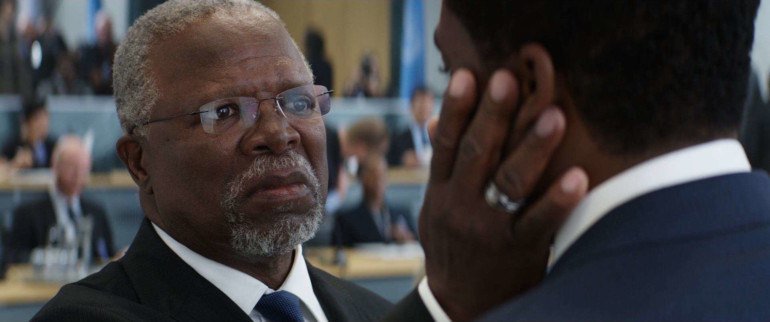
Countless books, television shows and movies have been produced based on the "Sins of the Father" theme (e.g., the popular "Black Panther" movie).
In the Bible, there are at least 24 references about "the sins of the father" or "the sins of thy fathers".
But what does "Sins of the Father" actually mean?
Sins of the Father or Sins of thy Fathers derives from Biblical references (primarily in the books Exodus, Deuteronomy, and Numbers) to the sins (or iniquities) of one generation passing to another.
The idea has been conveyed paraphrastically into popular culture.
Shakespeare wrote:

In ancient Greece, Euripides, one of the great tragedians of classical Athens, wrote:
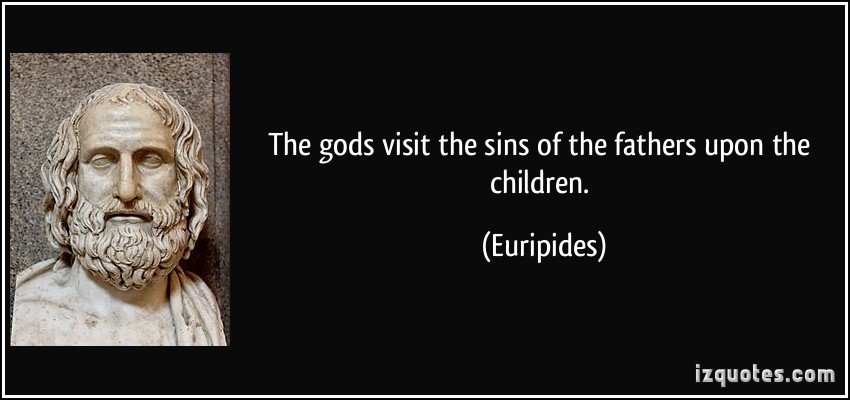
The plight of the Minotaur aptly depicts what can happen to the off-spring of a father or mother who has angered the Gods.
In the Minotaur's case, it was a double-whammy.
First, his father pisses off Poseidon. And then his mother commits a deviant sex act!
All this Trouble over a Bull?!
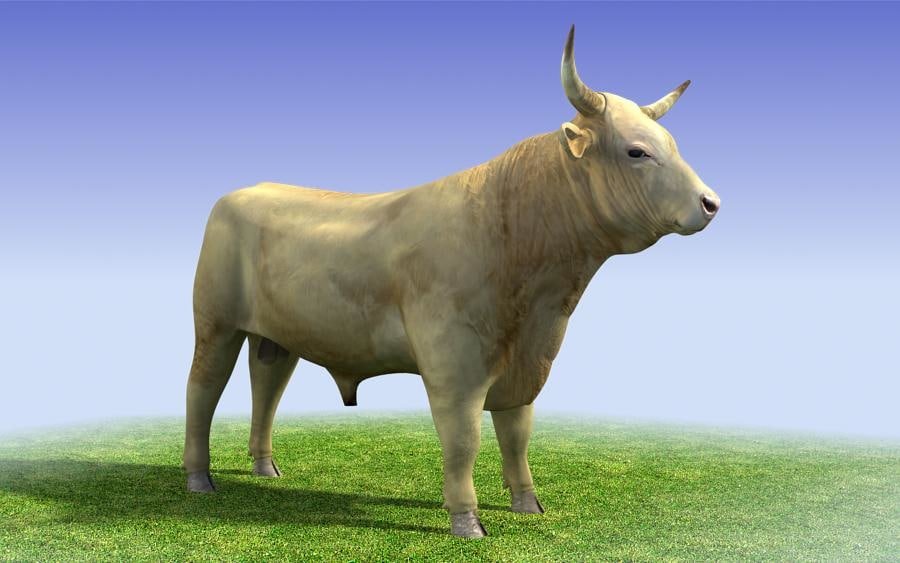
In Greek mythology, Minos was the first King of Crete. His parents were Zeus and Europa.
Every year, Minos was supposed to sacrifice his most prized bull to Poseidon. But then a special bull was born. To King Minos, it was the most beautiful bull he had ever seen. Poseidon or not, Minos couldn't slaughter such a magnificent animal.
So, thinking he could fool Poseidon, he didn't kill the special bull and sacrificed a lesser bull instead. Well, he wasn't as slick as he thought he was.
Poseidon saw through the ruse and decided to teach King Minos a lesson.
Sins of the Mother

In retribution for Minos' treachery, Poseidon did the ole' "Love Potion #9" thing on King Minos' wife - Queen Pasiphaë. Suddenly, the queen was lustful for the prized bull of Minos and performed an act of bestiality with the bull.
(Yup, that's right. She did the nasty with a bull! Now that's quite a visual, no!?)
And thus, the Minotaur was the resulting love child of Queen Pasiphaë and I guess, a very happy bull...
Note:
Technically speaking, "Minotaur" is a misnomer because its literal translation means "Minos' Bull"; while the Minotaur is actually the bastard son of Queen Pasiphaë and her bull lover.
Athenian Youth - The Ultimate Sore Losers
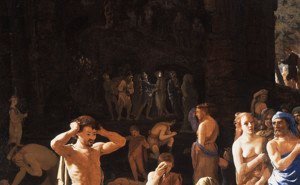
Prince Androgeus, the son of King Minos, participated in a sports competition in Athens.
He was so strong and athletically gifted that he swept all the events and claimed the title of "The Champion of the Athenian Games".
Of course, the youths of Athens were royally pissed off!
Fueled by the hatred of Crete's subjugation of Athens, the Athenian youth converged on Prince Androgeus and brutally murdered him.
Talk about sore losers!
It's like the riots that can break out between rival FIFA CUP fans - especially when a team loses on their home field!

The Power and Savagery of Crete

At the time, Crete was the most powerful city state in the region. It dominated all the surrounding, lesser city states - including Athens.
Not only was Crete renowned for their naval superiority, they were also regarded as savage barbarians.
Modern archaeologists have unearthed evidence (remains of human bones from the ancient Crete civilization) that indicate ritualistic human sacrifice had been part of the Cretan culture.

Even more surprising was the discovery of classic "butcher knife marks" - the same knife marks that are made when domesticated animals are slaughtered for the market or a meal - on many of the human bones from the archaeological dig site.
This can mean only one thing: Cannibalism in Crete.
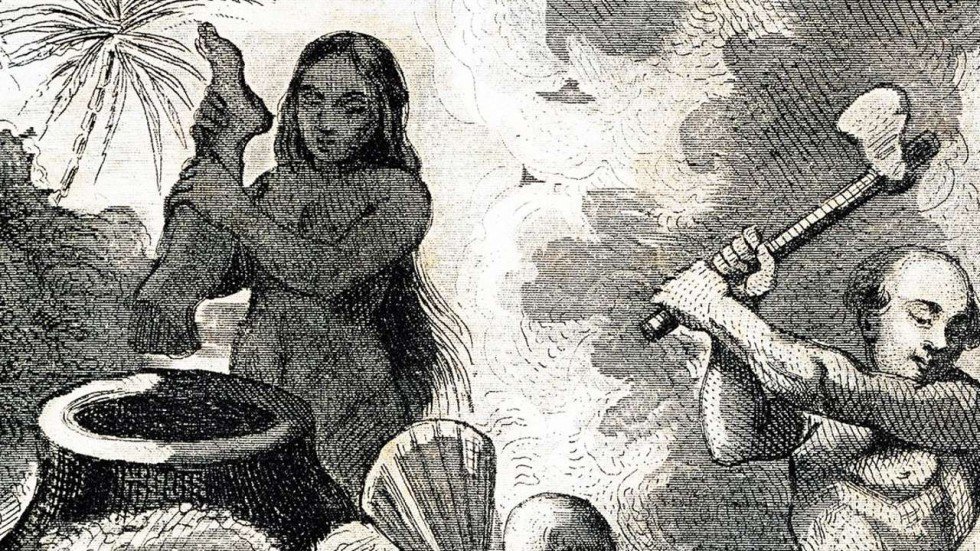
Crete Punishes Athens
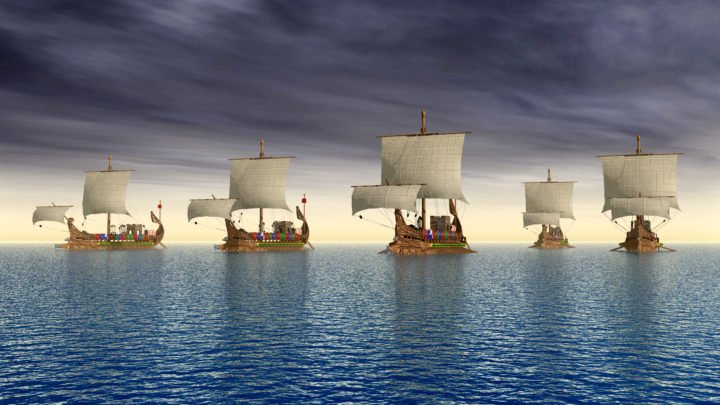
In response to the murder of Prince Androgeus, King Minos sent his mighty fleet of warships to Athens and offered this ultimatum:
Athens shall send a group of fourteen Athenian youths to Crete every nine years.
The group will consist of seven boys and seven virgins (virgins were considered closer to the Gods because of their "purity").
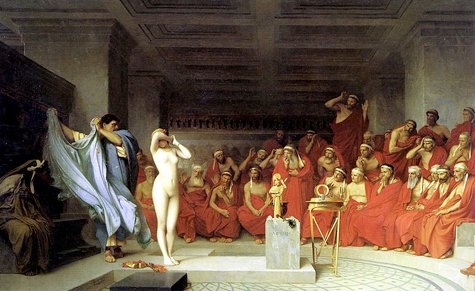
Shortly after landing upon Cretan shores, the group of youths will be fed to the Minotaur.
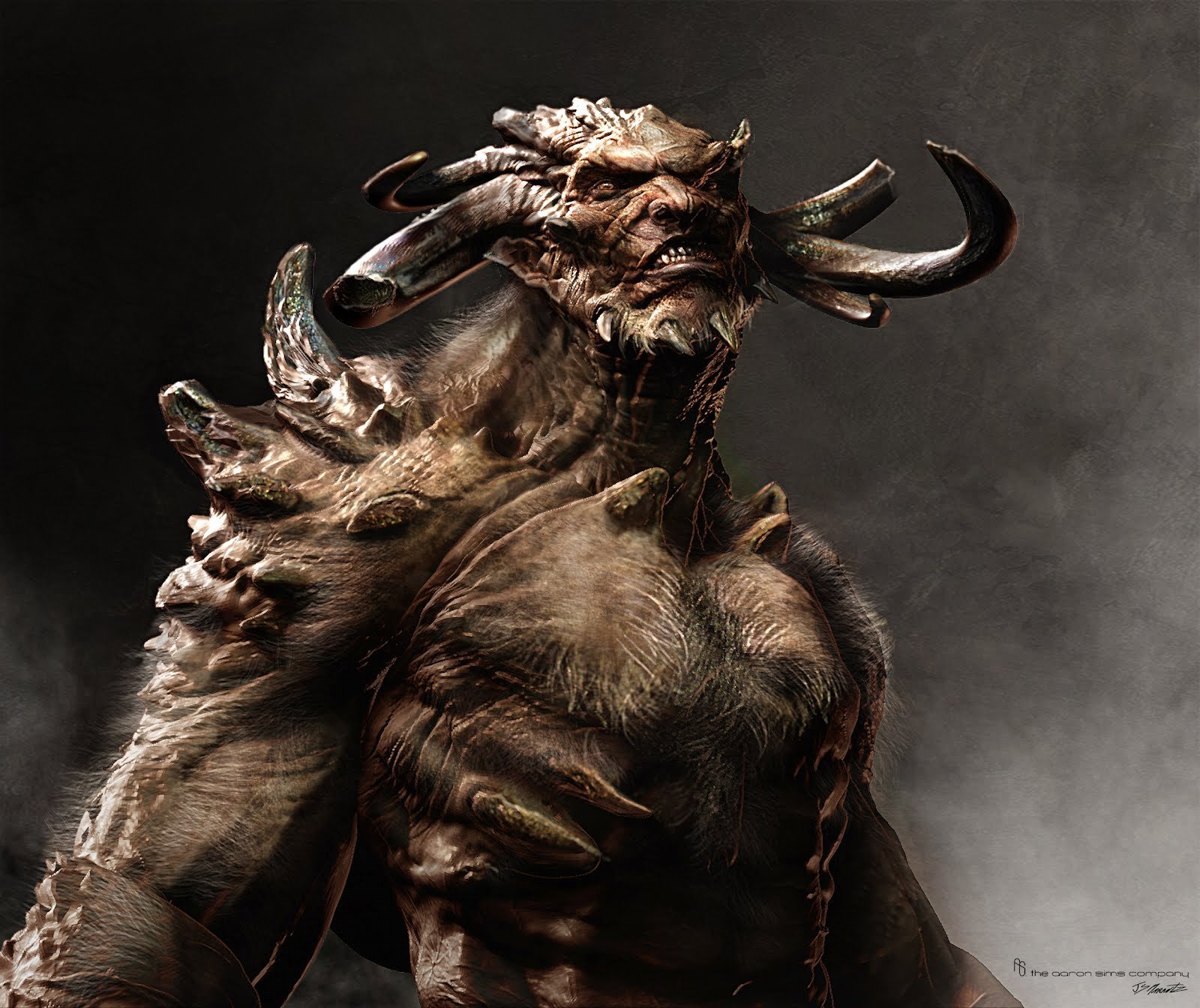
Noncompliance of this demand will result in an immediate war with Crete.
And given the size of Crete's military might, a Cretan victory over Athens was deemed by all as the inevitable outcome of such a war (meaning: The fall of the Athens city state and the total destruction of Athenian culture).
Not surprisingly, Athens acquiesced to King Minos' demands.
The Minotaur's Abode
After King Minos found out about the Minotaur's birth, he immediately ordered Daedalus and Icarus (of the famed story of "Icarus") to build an inescapable maze called "The Labyrinth".
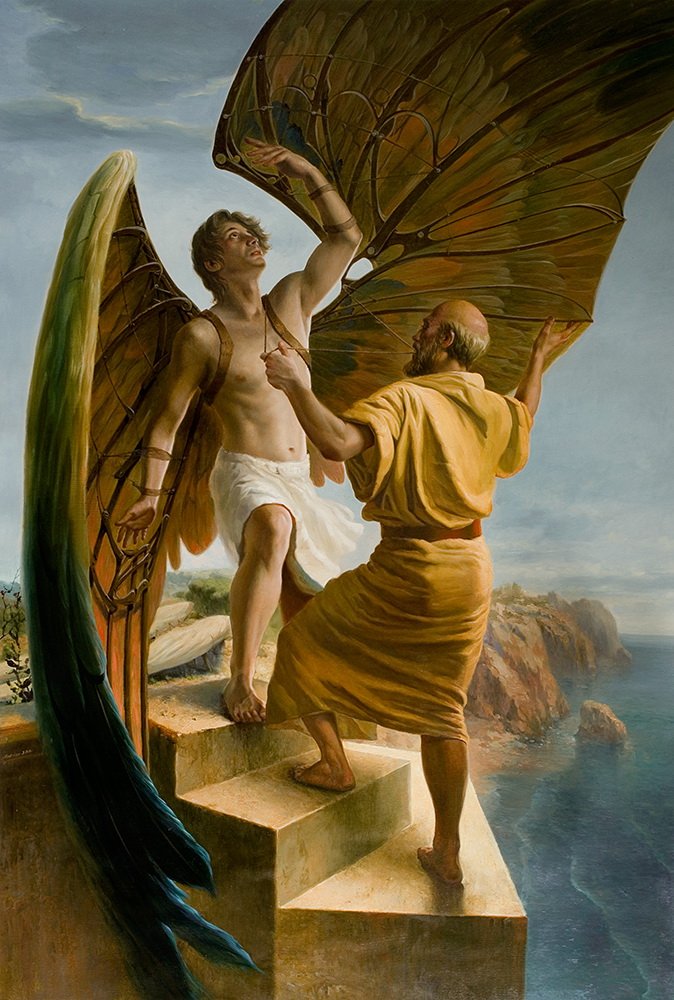
It was there in that place of countless dead ends and confusing passageways that Minos imprisoned the Minotaur.

It was also there that Minos sent Athenian youths to be killed and eaten by the Minotaur.
Theseus
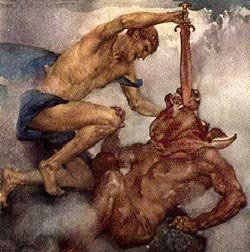
Theseus was the person who slayed the Minotaur.
He was the son of Queen Aethra - a promiscuous woman who had sex with both King Aegeus and Poseidon; resulting in the birth of Theseus.

When Theseus became an adolescent, he decided to end the practice of sacrificing Athenian youths to the flesh eating monster on Crete - the Minotaur.
Theseus joined the group of young Athenians to be fed to the Minotaur and sailed to Crete.
When they were off-loaded on the shores of Crete, Ariadne (the daughter of King Minos) was immediately smitten by the handsome and brave Theseus.
Love struck, Ariadne, on the condition that Theseus agrees to marry her, helps Theseus slay the Minotaur and escape the labyrinth.

She did this by giving Theseus a sword and a ball of thread (The thread of Ariadne) as a means of getting out of the labyrinth.
Note:
This secret method of tying thread to the entrance of the labyrinth, unwinding it as you step further in the maze, and then retracing your steps by retracting the thread line back to the entrance was revealed by Daedalus, the creator of "The Labyrinth", to a very grateful Ariadne.
Neat Fact:
The word "clue" comes from the word "clew" - a ball of yarn or thread; and in reference to the clew of thread given by Ariadne to Theseus, means "anything that guides or directs in an intricate case."

Conclusion: Why I feel sorry for the creature and am NOT a Big Fan of Theseus
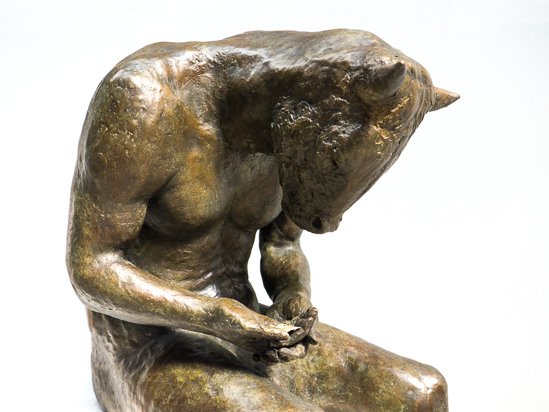
I feel sorry for the Minotaur.
Like other characters in many other Greek myths, the Minotaur was dealt a pretty shitty hand.
It wasn't his fault that King Minos tried to scam Poseidon. Nor was it in the Minotaur's power to keep his horny mother from mating with a bull.
Anthropomorphizing him a bit, I can imagine him feeling rather isolated. He was the only one of his kind and most likely was lonely at times (when he wasn't eating people).

I wonder if he ever felt remorse?
And who could blame him for feeling angry over his lot in life?
Since Athenian teens were not on the menu every year, I'm sure he had to eat whatever he could get his hands on.
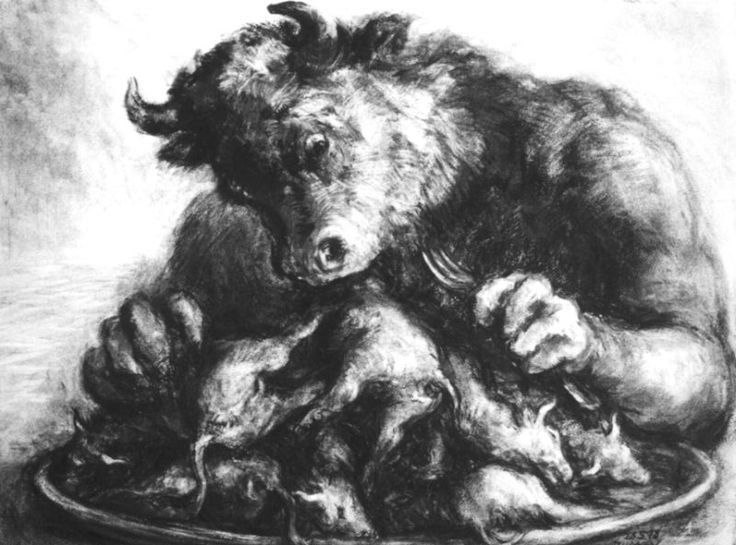
IMHO, even the fact that he devoured people doesn't really make him a "monster". Isn't that normal behavior for the top tier predatory carnivores of the food chain?
I mean, do we label all wild beasts in nature "monsters"?
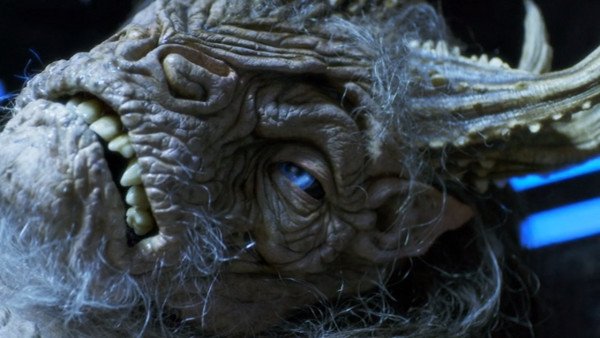
About the only reason I applaud the Minotaur's final death is NOT because of some "brave, young hero slaying the monster; and therefore, freeing his people from oppressive rule", but because the Minotaur was finally released from his pitiful, lonely and miserable existence.
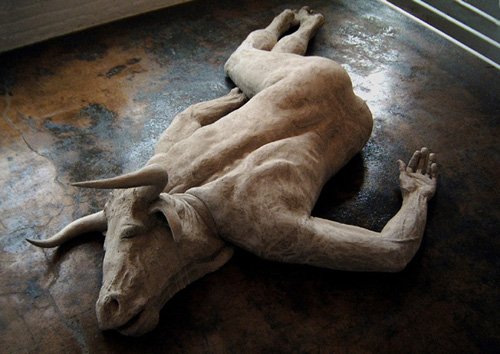
Things That Make Me Go Hmm About Theseus

Theseus is called a hero.
His victory over the Minotaur signaled a significant turning point in the history of Athens.
No longer would they tolerate the bullying of Crete and began building their own naval and military capabilities.
But to me, Theseus simply acted like a spoiled, opportunistic, and manipulative adolescent.

He didn't really want to marry Ariadne, but agreed to the marriage solely because he needed her assistance.
Also, either because of the "forgetfulness of youth" OR as a sinister, premeditated act to take over the throne, Theseus DID NOT fly the white sail of victory during his return trip back to Athens.
Instead, Theseus' ship flew the black sail of defeat and death.
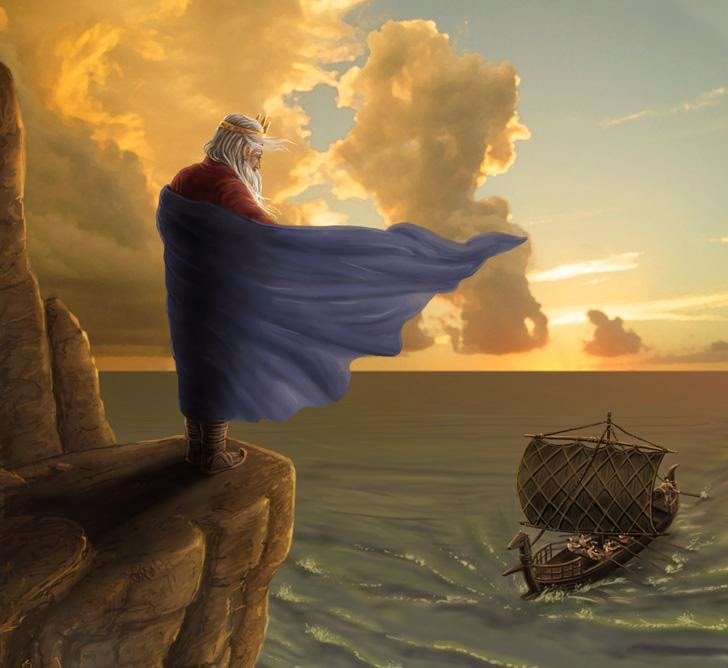
And seeing that black sail, Theseus father, King Ageus, was instantly stricken with grief over - what he believed was - the death of his son and immediately committed suicide by flinging his body off the Athenian cliff and into the depths of the sea.
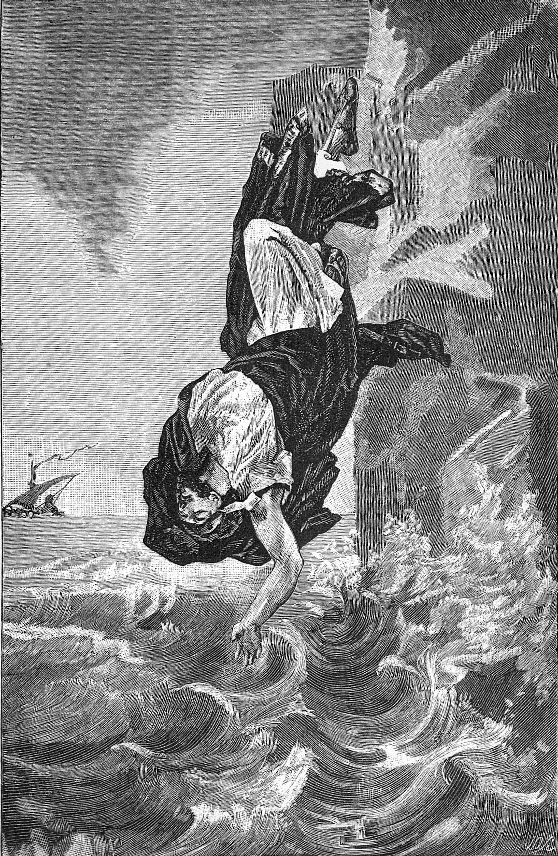
Clash of the Gods "The Minotaur" Video
Here is a great video produced by the History Channel about the Minotaur:
Thanks so much for accompanying me on my "Rediscovering Greek Mythology" journey!
By JaiChai
Mighty Kind of You for stopping by.
Truly hope to see you again!

About the Author
Believing that school was too boring, he dropped out of High School early; only to earn an AA, BS and MBA in less than 4 years much later in life – while working full-time as a Navy/Marine Corps Medic.
In spite of a fear of heights and deep water, he performed high altitude, free-fall parachute jumps and hazardous diving ops in deep, open ocean water.
After 24 years of active duty, he retired in Asia.
Since then, he's been a full-time, single papa and actively pursuing his varied passions (Writing, Disruptive Technology, Computer Science and Cryptocurrency - plus more hobbies too boring or bizarre for most folk).
He lives on an island paradise with his teenage daughter, longtime girlfriend and three dogs.






